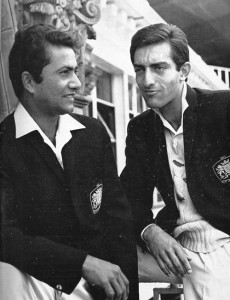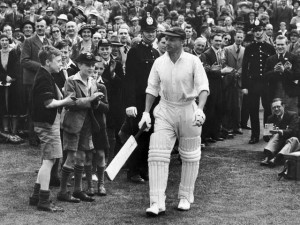Merchants of corruption ruin cricket as Sanga chooses to play the game
And it’s not for the sake of a ribboned coat/ Or the selfish hope of a season’s fame,/But his captain’s hand on his shoulder smote/”Play up! Play up! And play the game!” – Sir Henry Newbolt
Cricket, they say, is a gentleman’s game. The traditions that it has created and preserved, discipline that it has instilled in those who play the game, the perseverance that it has taught its participants and stoicism and magnanimity after a loss the players have exhibited are in its storied history. They have all contributed to the sport that we love as a “gentleman’s” game.
Barring a very few incidents on the field like Greg Chappell instructing his younger brother Trevor to bowl an under-arm ball, Gavaskar asking his partner to walk back with him to the pavilion when given out, are still etched in the memories of many a spectator and commentator. The glorious uncertainties of cricket have been highlighted in many illustrious books and movies written and produced by some superb directors, commentators, players and writers.
Great moments
Bradman’s unbelievable batting records, the mesmerizing spin bowling of Shane Warne and Muralitharan, the speed and accuracy of Lille, Thompson, Marshall and Holding, the doggedness of Tendulkar, the poetry in motion of Gary Sobers, the supreme beauty of Viv Richards’ strokes, Derek Underwood’s electric bowling on a turning wicket, these have been imprinted in the annals of cricketing history as enduring individual prowess.
Then there is the most glorious of all, the tied test between Australia and West Indies in 1962, which is dubbed as “The greatest test of all” by Jack Fingleton. Then we can talk about some giants among the cricket commentators, with John Arlott, Alan McGilvray, Trevor Bailey, Norman O’Neil, Tony Crosier and Brian Johnston. The battle between a slice of willow and a round of leather has produced some gems to be treasured for ages to come.
Sportsmanship
However, the “old school” cricket, the cricket of Bradman, Sobers, Len Hutton and Colin Cowdrey, and the Nawab of Pataudi and Vijaya Manjrekar gave way to the modern version of the game. The sportsmanship of Wally Grout not breaking the bails when Ken Barrington tripped at the middle of the pitch while taking a quick single may have fled the game forever.
The spirit must endure
Yet the spirit that encompassed the very atmosphere of the mighty Lords and MCG and Eden Gardens endures. Coupled with the enthusiasm and passion was competitiveness and eagerness of up and coming youngsters whose only purpose was to win at all costs. The game survived thanks mainly to the timely intervention by fairer minds and administrators. The evolution that began with Dr. W.G. Grace’s elementary skills has reached a zenith in the current format of 20/20.
The structure is still evolving, yet the fundamentals remain in tact rendering much needed flexibility to the nuts and bolts of

Hanif Mohammad and the Nawab of Pataudi (Mansur Ali Khan) chat at Lord's ahead of playing for the Rest of the World in 1965. Photo taken from espncricinfo.com
the apparatus. From match referees to the third umpire deciding on not-so-easy verdicts has caused delays to the game, however, it has provided satisfaction to the competitors’ desire to get it right.
Amidst all this development and the sprint to perfection, the spirit of the game has remained unchanged and unchangeable. The spirit that Pundit Nehru described in his celebrated book, “The Discovery of India” as all supreme has sustained the game of cricket throughout its 200 plus years.
What is cricket, but only a game
It is in this context that the words uttered by Kumar Sangakkara at the hallowed halls of the Lords are most applicable to the inner workings of modern cricket, not only in ways the game is played on the field, but also in the manner it is administered as an enterprise. After all, what is cricket? It is only a game.
Pundits over ages have attributed many qualities and characteristics to the game; how it should shape a youngster’s mind etc. The moment one loses sight of that one single fact, one loses the joy and thrills the game delivers. From humble beginnings to the glory of the world cup
Stirring
Sangakkara’s reference to the development of the game in Sri Lanka from humble beginnings to the ’96 World Cup glories,
his fond tributes to the yesteryear greats, I am sure, stirred many a heart and soul. The humility that he exhibited in the description of how he felt during the euphoria resulting from the World Cup victory, all told of an enduring spirit of the game.
Merchants of corruption
Yet, his allusions to the dismal stage the Sri Lankan cricket administration finds itself in, to the inevitable interferences by corrupt politicos whose unquenched thirst for glory by proxy received more publicity in the world media. One cannot help it. Embroiled in controversy after controversy, the Sri Lankan regime looks to find solace in the success of its cricket team. Attracted by the enormity of wealth and popularity of the game and its administration these bankrupt merchants of corruption and deceit continue to attempt to muddy a noble enterprise, paying callous and scant regard to the finer nuances of this great game of ours. Desecrating the very sacred foundations of the game, they tend to enrich their fast-dwindling reputation in the sphere of human rights and accountability by shooting the messenger because they can hardly bear the truths of the message. Nevertheless, the spirit will endure.
None put into words the true spirit of the game as did Sir Henry Newbolt when he penned his famous poem Vitaï Lampada in 1892.
There’s a breathless hush in the Close to-night
Ten to make and the match to win
A bumping pitch and a blinding light,
An hour to play, and the last man in
All the pressures of the mundane world are captured in the very beginning of this great stanza. How many schoolboys would have dreamt of being the last man in with an hour to play? Sanga was the last man in and many an hour to play. As he has done on innumerable occasions on the most difficult pitches world over, Sangakkara put his head down and elbow straight and played the ball according to its merits. In this memorable innings at the Hall of the Lords, he cut and drove, hooked and pulled and defended the good one and let go of the stray ones.
Sir Henry continues…
And it’s not for the sake of a ribboned coat.
Or the selfish hope of a season’s fame,
But his captain’s hand on his shoulder smote
“Play up! Play up! And play the game!”
We have fond memories of many a Bradman inning, the grace of Sir Gary, the hypnotic effect of a Chandrasekhar googly

India's Sachin Tendulkar holds an autographed bat presented to him, as former West Indies legend Sir Gary Sobers applauds, during an event in Mumbai. Photo taken from msn sports
and the agility of Allen Knott, the deadly swing of Sir Richard Hadley, the dogged perseverance of Barrington and the beauty of a Tom Graveney cover drive. To these treasured memories will be added Sangakkkara’s “Sir Colin Cowdrey memorial oration”.
Stark truths
His intention was not to glorify himself, but to bear open some stark truths. Not to make excuses but to admit to responsibility and accountability. The timing and the choice of location for his utterances speak volumes for his shrewd craftiness of mind. The injection of home truths about the corrupt practices of the current cricketing administration in Sri Lanka into his oration speaks for the daring of a probing intellect.
And to those who complain that the publicity given to Sanga’s references to the current situation in Sri Lanka’s cricket administration overshadowed the brilliance of the rest of it, I say, would Sanga’s “Sir Colin Cowdrey Memorial Oration” have received half the publicity had Sanga not mentioned any of those home truths? I don’t think so. In the immortal halls of the Lords, Sangakkara chose to play the game in the highest spirit, in which it should be played.
Sanga, you have done us proud.




October 8, 2011 at 12:58 am
Your article was excellent and eurtide.